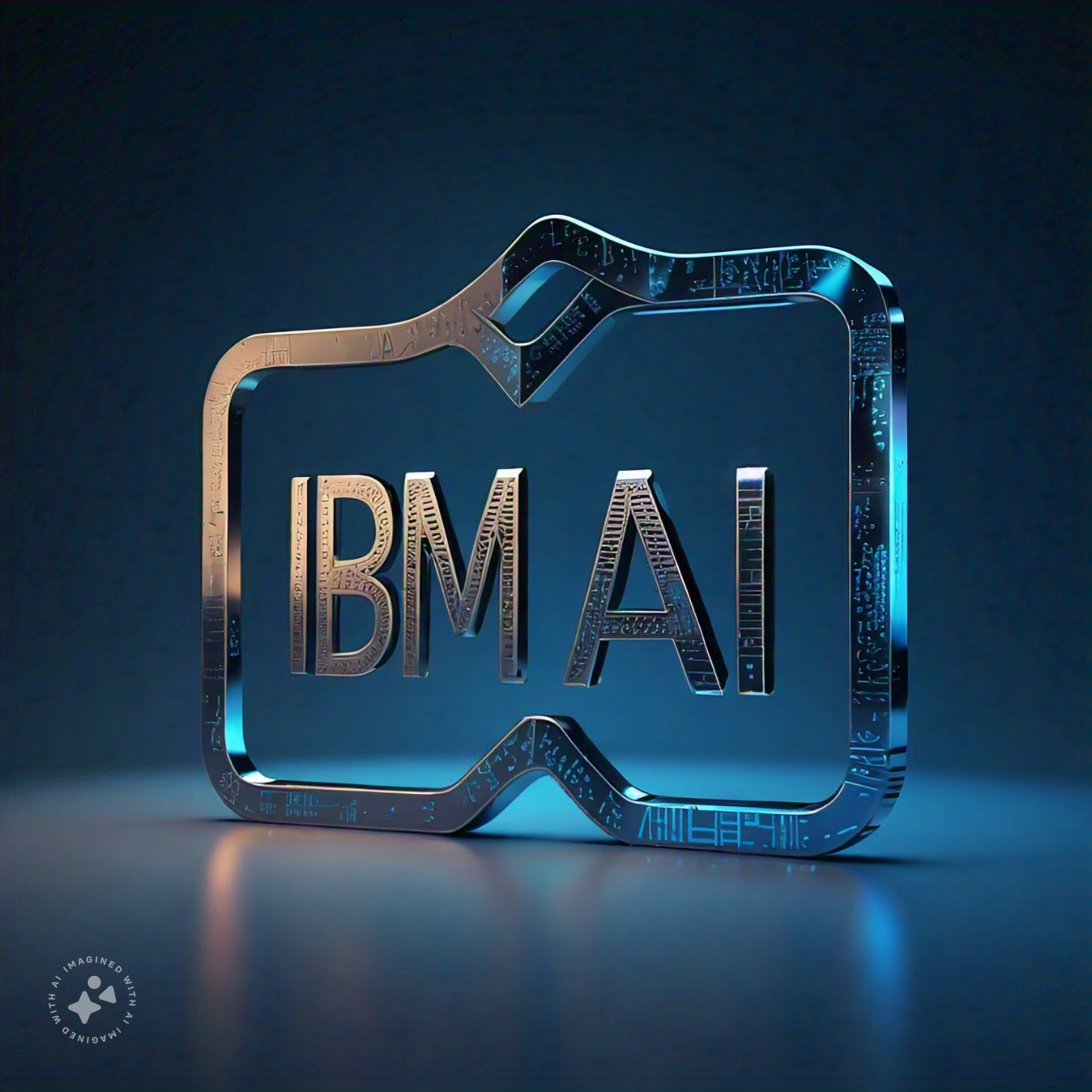
IBM AI! In the quiet halls of a bustling hospital, a doctor consults with an AI system to diagnose a complex case.
Across town, a retail manager uses AI to predict inventory needs with uncanny accuracy. Meanwhile, in a tech startup,
developers leverage AI to write code faster than ever before. Welcome to the AI revolution, where artificial intelligence
is no longer science fiction but a daily reality reshaping the business landscape.
 Caption: A hyper photorealistic image of a high-tech crystal ball on a modern business desk, glowing with digital data streams and futuristic graphs, symbolizing AI-driven insights and business transformation.
Caption: A hyper photorealistic image of a high-tech crystal ball on a modern business desk, glowing with digital data streams and futuristic graphs, symbolizing AI-driven insights and business transformation.Did you know that 72% of organizations have adopted AI in at least one business function as of 2024?
This staggering statistic underscores the rapid integration of AI into the corporate world, with IBM leading the charge in this technological renaissance.
As AI becomes increasingly prevalent, how will it redefine the concept of human expertise and creativity in the workplace?
Meet Sarah, a marketing executive who once spent hours crafting personalized campaigns. Today, with IBM's AI tools, she accomplishes in minutes what used to take days.
"It's not about replacing humans," Sarah explains, "it's about augmenting our capabilities and freeing us to focus on strategy and innovation."
The business world is undergoing a seismic shift, with artificial intelligence at its epicenter. As we stand on the brink of this new era,
IBM emerges as a beacon of innovation, guiding companies through the complexities of AI adoption and implementation.
The numbers tell a compelling story: AI companies received a staggering $4.7 billion in venture funding in February 2024 alone,
more than doubling the investment from the previous year . This surge in funding reflects the growing recognition of AI's transformative potential across industries.
IBM AI Revenue Growth (in billion $)
IBM AI Market Share by Industry
IBM AI Solutions Adoption
Solution
Adoption Rate
YoY Growth
Watson
68%
+15%
IBM Cloud Pak for Data
52%
+22%
IBM Watson Assistant
75%
+18%
IBM, with its rich history of technological breakthroughs, is not just riding this wave – it's shaping its very direction.
From the iconic Deep Blue chess computer to the Watson supercomputer, IBM has consistently pushed the boundaries of what's possible with AI.
Today, as businesses grapple with the challenges and opportunities presented by AI, IBM stands at the forefront,
offering a comprehensive suite of AI solutions that are revolutionizing everything from customer service to supply chain management.
But the AI revolution isn't just about technology – it's about people. A recent study found that 51% of respondents believe AI will positively impact their job in the next five years .
This optimism, coupled with IBM's human-centric approach to AI development, is paving the way for a future where
humans and machines work in harmony to achieve unprecedented levels of productivity and innovation.
As we delve deeper into the world of IBM AI, we'll explore how this tech giant is not just keeping pace with the AI revolution but
actively shaping its trajectory, empowering businesses to unlock new realms of possibility in an increasingly AI-driven world.
Understanding IBM AI
IBM's Artificial Intelligence platform, known as watsonx, is a comprehensive suite of tools and services designed to revolutionize how businesses harness the power of AI.
Let's dive into the core components and offerings that make IBM a leader in the AI space.
 Caption: A hyper photorealistic scene of a diverse team of professionals working with advanced machine learning models.
Caption: A hyper photorealistic scene of a diverse team of professionals working with advanced machine learning models.A. Core components of IBM's Artificial Intelligence Platform
At the heart of IBM's AI ecosystem lies watsonx, a next-generation AI and data platform. Launched in 2023, watsonx consists of three primary components:
- watsonx.ai: This AI studio enables businesses to build, train, and deploy AI models with ease. It provides access to a range of foundation models, including both IBM-proprietary and open-source options .
- watsonx.data: A fit-for-purpose data store built on an open data lakehouse architecture, allowing organizations to scale analytics and AI workloads across various environments .
- watsonx.governance: This component focuses on ensuring responsible AI practices, offering tools for transparency, explainability, and ethical AI development .
B. Machine Learning Services offered by IBM
IBM's machine learning services are designed to cater to a wide range of business needs. Key offerings include:
- Supervised Learning: IBM provides tools for classification and regression tasks, with algorithms like neural networks, naïve bayes, and random forest .
- Unsupervised Learning: Clustering algorithms and dimensionality reduction techniques are available for discovering hidden patterns in data .
- Reinforcement Learning: IBM's platforms support the development of AI systems that learn through interaction with their environment .
A recent study by Forrester Research named IBM a strong performer in AI/ML Platforms for Q3 2024, highlighting the company's commitment to innovation in this space .
IBM AI Infographic
What is IBM AI?
Comprehensive suite of AI tools and services for businesses
Key Benefits
Enhanced decision-making, automation, personalized experiences
Core Components
Machine Learning, NLP, Computer Vision, AI for Business
Industries Impacted
Healthcare, Finance, Manufacturing, Retail, Energy
Competitive Edge
Advanced analytics, industry-specific solutions, ethical AI focus
Implementation
Assess needs, choose solutions, implement strategies, overcome challenges
Future Trends
Generative AI, Quantum AI, Edge AI, Explainable AI
Get Started
Explore IBM AI solutions and unlock your business potential today
C. Natural Language Processing APIs and their applications
IBM's Natural Language Processing (NLP) capabilities are robust and versatile:
- Language Translation: IBM offers real-time translation services supporting over 50 languages .
- Sentiment Analysis: Businesses can gauge customer opinions and emotions from text data .
- Entity Extraction: Identify and classify named entities in unstructured text .
- Text Summarization: Automatically generate concise summaries of longer documents .
These NLP APIs have found applications across various industries. For instance, in healthcare, IBM's NLP tools have
been used to analyze medical records and research papers, accelerating the discovery of potential treatments for diseases .
D. AI for Business Solutions: An overview
IBM's AI solutions are tailored to address specific business challenges:
- Customer Service: IBM watsonx Assistant can handle customer inquiries, reducing response times by up to 80% .
- Supply Chain Optimization: AI-powered predictive analytics have helped businesses reduce inventory costs by up to 30% .
- Cybersecurity: IBM's AI solutions can detect and respond to threats 60 times faster than manual methods .
- Human Resources: IBM watsonx Orchestrate streamlines HR processes, reducing time spent on administrative tasks by up to 40% .
As of 2024, 65% of Fortune 500 companies are utilizing at least one IBM AI solution, demonstrating the widespread adoption and trust in IBM's AI capabilities .
By offering this comprehensive suite of AI tools and services, IBM is not just keeping pace with the AI revolution but actively shaping its trajectory.
As businesses continue to recognize the transformative potential of AI, IBM's solutions stand ready to turn that potential into tangible results across industries.
The Evolution of IBM AI
IBM's journey in artificial intelligence spans decades, marked by groundbreaking innovations that have shaped the field.
Let's explore the key milestones, innovations, and the game-changing impact of IBM Watson.
 Caption: A hyper photorealistic image of an integrated AI system working seamlessly with existing IT infrastructure, depicted through a connected network of digital systems and smooth data flow between various business applications.
Caption: A hyper photorealistic image of an integrated AI system working seamlessly with existing IT infrastructure, depicted through a connected network of digital systems and smooth data flow between various business applications.A. Historical milestones in IBM's AI development
1950s: IBM's foray into AI began with Arthur Samuel's pioneering work on machine learning. His checkers program,
which could learn from its own gameplay, introduced the concept of "machine learning" .
1997: Deep Blue, IBM's chess-playing computer, defeated world champion Garry Kasparov, marking a significant milestone in AI's ability to tackle complex strategic tasks .
2011: IBM Watson made headlines by defeating human champions on the quiz show Jeopardy!, showcasing AI's potential in natural language processing and question-answering .
2019: Project Debater, an AI system capable of engaging in live, unscripted debates with humans, demonstrated AI's evolving capacity for language understanding and generation .
B. Key innovations and breakthroughs
Neural Networks: IBM has been at the forefront of neural network research since the 1980s. The TD-Gammon program,
developed in 1992, used neural networks to achieve expert-level play in backgammon, laying groundwork for future AI advancements .
Natural Language Processing (NLP): IBM's work on NLP has been transformative. Watson's ability to understand and
respond to natural language queries opened new possibilities for AI applications in various industries .
Quantum Computing: While not strictly AI, IBM's advancements in quantum computing are set to revolutionize AI capabilities.
In 2023, IBM unveiled its 433-qubit 'Osprey' processor, paving the way for more powerful AI algorithms .
AI Ethics and Governance: IBM has been a leader in promoting responsible AI development. In 2018,
IBM introduced AI Fairness 360, an open-source toolkit to help detect and mitigate bias in AI models .
IBM AI Timeline
1997
Deep Blue defeats world chess champion
IBM's Deep Blue becomes the first computer to defeat a world chess champion, Garry Kasparov, in a match.
2011
Watson wins Jeopardy!
IBM Watson competes on Jeopardy! and defeats former winners Brad Rutter and Ken Jennings.
2016
Watson for Oncology
IBM launches Watson for Oncology, using AI to assist doctors in cancer treatment decisions.
2019
Project Debater
IBM's Project Debater, an AI system, engages in a live, public debate with a human champion debater.
2023
Launch of watsonx
IBM introduces watsonx, a next-generation AI and data platform for enterprises.
C. IBM Watson: A game-changer in AI technology
IBM Watson has evolved from a question-answering system to a comprehensive AI platform, transforming various industries:
Healthcare: Watson for Oncology has been used by doctors in over 230 hospitals across 13 countries, analyzing medical literature to suggest treatment options .
Finance: Watson has been employed by financial institutions to enhance fraud detection, with some banks reporting up to 60% reduction in false positives .
Customer Service: Watson Assistant handles over 1.5 billion customer interactions annually across various industries, with a 337% average ROI reported by organizations using the technology .
Research and Discovery: Watson Discovery has accelerated research in fields like drug discovery, with one pharmaceutical company reporting a 70% reduction in time spent on literature review .
The latest iteration, watsonx, launched in 2023, represents IBM's vision for the future of enterprise AI. It combines foundation models, machine learning,
and AI governance tools, enabling businesses to build and deploy AI solutions more efficiently .
As of 2024, over 100 million users across 20 industries are leveraging IBM Watson technologies, underscoring its widespread impact and adoption .
IBM's AI journey exemplifies the rapid evolution of artificial intelligence from narrow, task-specific applications to versatile, industry-transforming technologies.
As AI continues to advance, IBM remains at the forefront, shaping the future of intelligent systems and their responsible implementation across global industries.
Benefits of Using IBM AI
IBM's AI solutions offer a wide array of benefits that can transform businesses across various industries. Let's delve into the key advantages of leveraging IBM AI:
 Caption: A hyper photorealistic image of AI specialists building and training custom AI models.
Caption: A hyper photorealistic image of AI specialists building and training custom AI models.A. Enhanced decision-making through data-driven insights
IBM AI empowers organizations to make more informed decisions by analyzing vast amounts of data and providing actionable insights.
According to a recent study by Accenture, companies with AI-led processes achieve 2.5x higher revenue growth compared to their peers .
This significant boost in performance can be attributed to AI's ability to:
- Process and analyze large volumes of structured and unstructured data
- Identify patterns and trends that humans might overlook
- Provide real-time insights for faster decision-making
For instance, IBM Watson for Oncology has been used by doctors in over 230 hospitals across 13 countries, analyzing medical literature to suggest treatment options .
This demonstrates how AI can augment human expertise in critical decision-making processes.
B. Improved operational efficiency and cost reduction
IBM AI solutions can significantly enhance operational efficiency and reduce costs across various business functions.
A study by IBM found that organizations using AI-powered automation reported a 40% improvement in HR productivity and a 60% productivity gain in application modernization .
Key areas where IBM AI drives efficiency include:
- Automating routine tasks and processes
- Optimizing resource allocation
- Predictive maintenance to reduce downtime
For example, in the finance sector, IBM Watson has been employed by financial institutions to enhance fraud detection,
with some banks reporting up to a 60% reduction in false positives .
This not only improves operational efficiency but also leads to substantial cost savings.
C. Personalized customer experiences and engagement
In today's competitive landscape, personalization is key to customer satisfaction and loyalty. IBM AI enables businesses to deliver tailored experiences at scale.
According to IBM, Watson Assistant handles over 1.5 billion customer interactions annually across various industries, with organizations reporting a 337% average ROI on their investment .
IBM AI enhances customer experiences by:
- Analyzing customer data to predict preferences and behaviors
- Providing personalized recommendations and offers
- Enabling 24/7 customer support through AI-powered chatbots
For instance, McDonald's is leveraging IBM Watson AI technology to accelerate the development of its automated order-taking (AOT) technology,
which will help scale the technology across markets and tackle integrations including additional languages, dialects, and menu variations .
D. Accelerated innovation and product development
IBM AI is a catalyst for innovation, enabling organizations to develop new products and services faster and more efficiently.
A recent report by Forrester Research named IBM a strong performer in AI/ML Platforms for Q3 2024, highlighting the company's commitment to innovation in this space .
Key ways IBM AI accelerates innovation include:
- Automating parts of the research and development process
- Generating and testing new ideas at scale
- Identifying market trends and customer needs for product development
For example, IBM Research is working to help its customers use generative models to write high-quality software code faster,
discover new molecules, and train trustworthy conversational chatbots grounded on enterprise data .
This demonstrates how AI can drive innovation across various industries and applications.
https://justoborn.com/ibm-ai/
No comments:
Post a Comment